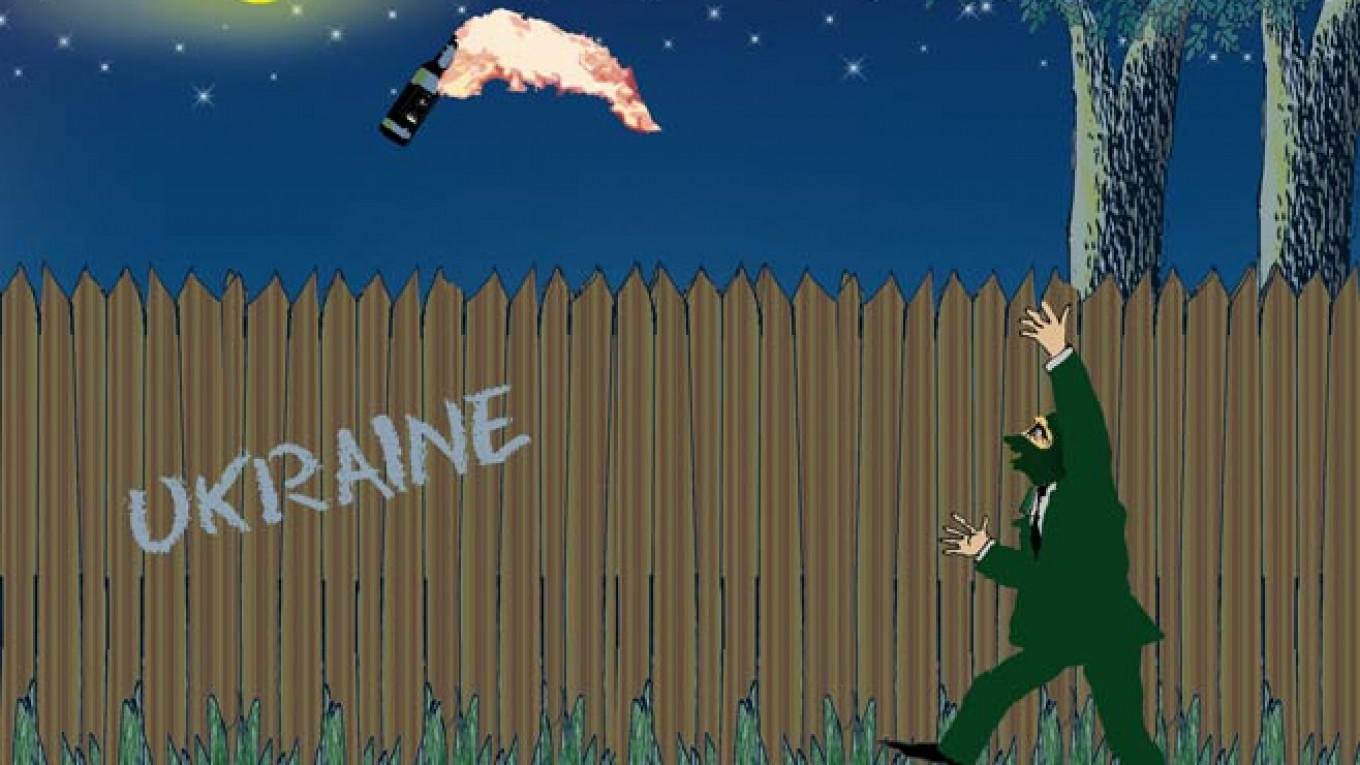Ukraine moved dangerously close to civil war over the May holidays. The biggest tragedy occurred in Odessa where pro-Russian activists attacked a pro-Ukrainian rally made up mainly of football fans. Numerous photo and video recordings of the event show that the Russian attackers used firearms. But the pro-Ukrainian nationalists outnumbered them and forced the Russian activists into a trade union building. Both sides began throwing firebombs at each other, and, as a result, the building caught fire and at least 42 people died in the blaze.
Kremlin spin doctors instantly linked the tragedy with the attempts by the authorities in Kiev to establish control over several cities in Ukraine's south and east that have been seized by what Russian state-controlled media refer to euphemistically as "supporters of federalization."
Russia wants to destabilize the southern and eastern regions of Ukraine with an insurgency. The resulting chaos and de facto civil war will enable Moscow to proclaim Ukraine's May 25 presidential election as illegitimate.
It seems that Kiev is much to blame for the Ukrainian crisis in general. At the same time, however, it is a pardonable mistake. After Russia annexed Crimea and pro-Russian separatists seized one city after another, the public demanded that Ukrainian leaders take decisive action to try to control the chaos. But in recent decades, leaders everywhere have failed to achieve victory against paramilitary forces that use civilians as human shields.
If the Ukrainian Army attacks the insurgents and inadvertently causes civilian casualties, it will be accused of using excessive force, turning a short-term military victory into a political defeat. In most cases, though, the fear of killing civilians dissuades leaders from carrying out such operations. That was the case with the U.S. Army in Somalia in 1993, and again 10 years later in Iraq and Afghanistan. It has nothing to do with the skill of the troops involved. Ever since World War II, the public's values have changed regarding the acceptable number of casualties in any military conflict.
In the Ukrainian conflict, even if the authorities retake this or that city, the separatists will immediately seize a different one. So, as the Ukrainian Army tightens its hold on Slovyansk, for example, the separatists seize the army recruitment office in Luhansk. And if the authorities manage to put out that fire in Luhansk, the insurgents will pop up somewhere else.
Several of my colleagues were quick to suggest that Moscow was waging a new type of warfare in Ukraine, but from the standpoint of military theory there is nothing new about it. More than 2,000 years ago, Chinese military leader Sun Tzu wrote: "to go to battle 100 times and win 100 victories is a bad strategy. It is far better to conquer a foreign army without a single battle."
Prominent military theorist Yevgeny Messner developed the theory of "war through insurgency." More than half a century ago, he wrote that opposition to the ruling authorities "produces irregular forces — ordinary citizens who use unconventional methods to fight the authorities and the army. Within the army itself, it introduces the ideology of desertion, treason and insubordination." Messner adds that ordinary defenses are useless when a country's army is physically surrounded by "irregulars and its own citizens raging with political passions."
Objectively speaking, Russia is waging a proxy war in the southern and eastern regions of Ukraine that it is bound to win. While Moscow flatly denies any meddling in Ukraine, the facts speak otherwise. Several Ukrainian Army helicopters were recently shot down near Slovyansk by man-portable air-defense systems, or MANPADS. These weapons are not stored in police stations or even Ukrainian security service offices, meaning that the insurgents could not have seized them locally. What's more, it takes considerable skill to operate a MANPAD. The most likely explanation is that these weapons were brought in by units of Russia's special forces.
The Kremlin's strategic plan became clear over the May holidays. It intends to destabilize the southern and eastern regions of Ukraine with an insurgency. The resulting chaos and de facto civil war will enable Moscow to proclaim Ukraine's May 25 presidential election as illegitimate and Putin will send a clear message to any former Soviet republic that it should not even consider establishing closer ties with Europe.
At the same time, however, NATO Deputy Secretary-General Alexander Vershbow said last week that the alliance had no other choice under the present circumstances but to view Russia as a potential adversary. Meanwhile, U.S. Defense Secretary Chuck Hagel has urged Western nations to boost military spending. Although it will not happen overnight, the remilitarization of Europe and the U.S. will happen relatively quickly. Once it does, Russia will become locked into another arms race with the West. And as everyone knows, the last one ended with the collapse of the Soviet Union.
Alexander Golts is deputy editor of the online newspaper Yezhednevny Zhurnal.
A Message from The Moscow Times:
Dear readers,
We are facing unprecedented challenges. Russia's Prosecutor General's Office has designated The Moscow Times as an "undesirable" organization, criminalizing our work and putting our staff at risk of prosecution. This follows our earlier unjust labeling as a "foreign agent."
These actions are direct attempts to silence independent journalism in Russia. The authorities claim our work "discredits the decisions of the Russian leadership." We see things differently: we strive to provide accurate, unbiased reporting on Russia.
We, the journalists of The Moscow Times, refuse to be silenced. But to continue our work, we need your help.
Your support, no matter how small, makes a world of difference. If you can, please support us monthly starting from just $2. It's quick to set up, and every contribution makes a significant impact.
By supporting The Moscow Times, you're defending open, independent journalism in the face of repression. Thank you for standing with us.
Remind me later.







